The American Revolution resulted from a long struggle between the British monarchy and its American colonists. The colonists were subjected to taxes and tariffs from the distant monarchy. Fearing that they were losing the fight for their rights as Englishmen, the colonist took up arms against the British, having their first exchange of gunfire in Lexington and Concord in April 1775.1 The war was brutal and the Americans could not catch a break from the British. With their limited supplies, the British had more soldiers and better equipment than the Americans. As the British recruited more soldiers, the colonist needed more help than ever since they were not doing well in the battles. They needed help from other countries, and one of their biggest allies was France. The French weren’t too sure about helping the Americans, so they were subtle in sending money and supplies to the colonists. The Americans proved themselves to the French that they could win their war when they won the Battle of Saratoga after a British general surrendered.2
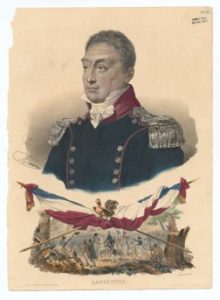
While all this was happening, this war caught the eye of the Marquis de Lafayette. He was a young man in the French army, stationed in the citadel of Metz at just eighteen years old. Lafayette heard what was happening on the other side of the Atlantic, and he wanted to join in on the fight for “the adventure.” An exiled duke from Great Britain was in search of men who were willing to aid the Americans. After Lafayette heard this, he left his station in Metz and became the first agent for the Americans.3
After leaving his station in Metz, he tried to find transportation, and everyone was discouraging him from going to America. They rejected his plans to the point that many people refused to give him a ship to travel in. He became desperate, but due to his high status and wealth, he responded with “This is precisely the moment to serve your cause; the more people are discouraged, the greater utility will result from my departure; and if you cannot furnish me with a vessel, I will freight one at my own expense, to convey your dispatches, and my person, to the shores of America.”4 Many in France were not happy with Lafayette leaving for America, and they sent threats to him if he left for America; but despite the threats and the refusal of a ship, he did not listen to a word they said. He soon bought a ship at his own expense and was ready to sail to the shores of America.5
After his departure to America, many Frenchmen were so furious with Lafayette that they took his property. Even his travel to America was tough, since the British heard that the Frenchman was coming to help the Americans. The mere thought of a wealthy Frenchman coming to help Americans threw the British into a spiral of needing to stop him. While sailing, Lafayette was on high alert constantly, since he did not want to get captured by the British. On June 13, after spending forty-four days at sea, he arrived on the shores of America. The news of his arrival spread quickly in France and in America; even newspapers were sent out about his arrival.
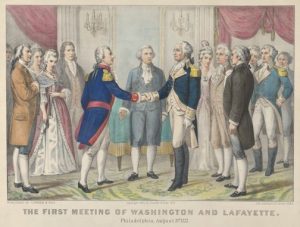
As he began his American experience, he was faced with unexpected backlash from the Continental Congress, because Lafayette might have been in the army, but he lacked combat experience or even leadership skills. All Congress saw was a scrawny nineteen-year-old with big ambitions.6 But the Americans had nothing to lose at the moment; many men were dying from diseases and battles with the British. The Americans didn’t know it at the time, but Lafayette was someone they needed in order to win the war, and it’s not every day you get a wealthy young Frenchman to be appointed Major General for free. During this time, he was appointed Major General under the guidance of Commander in Chief George Washington, who disliked him from the start of his alliance; but after a while, they soon developed a father-son friendship with each other.7
At the beginning of his joining as a Major General, Lafayette manage to bring around 1,200 French soldiers to sail from France to Virginia. He soon brought over more men as time flew by, adding up to 4,200 French soldiers, along with soldiers of Lafayette’s. He managed to bring more supplies, weapons, and anything that was needed for the Americans to win the war. After some time and many battles later, one of the biggest turning points was ahead of the Americans and it was the use of Lafayette’s strategy that brought victory to the Americans. The Battle of Yorktown was one of the most critical battles in the Revolutionary War. In early August, 1781, Cornwallis, a British Army General was going to fortify Yorktown, and Lafayette saw this opportunity. He came up with a strategy to defeat the British or at least cause some kind of damage to their army.8 His strategy was to stay close to Cornwallis while he was in Yorktown and get some kind of information; but he kept his distance of 20-30 miles from him, to not alert the British of their presence. His stealth when it came to getting information from those within the British was how he found out the British were heading to Yorktown.9 This opportunity to strike the British was a once in a lifetime. If they managed to strike the British, they had a greater chance of winning, and they took that chance with everything they had. Lafayette notified Washington about the British heading to Yorktown and urged Washington to head southward to cut off and corner Cornwallis in Yorktown.10 While Washington went southward to cut them off, Lafayette came from the front and attacked them so they would be caught in a surprise. Both militias together made 17,000 American and French soldiers, along with many others fighting alongside the Americans, which was more than Cornwallis had. The Battle of Yorktown was a very brutal and bloody three weeks Americans faced. Blood, sweat, and tears were shed continuously for those weeks. The result afterward was watching the light reflect off a white flag from the British saying they were surrendering. Lafayette’s contribution during this battle was what gave the Americans a victory in the end, despite having a chance of losing everything.11
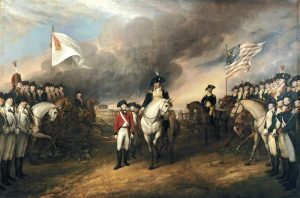
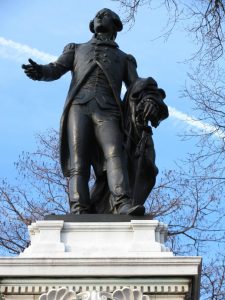
Two years after the Battle of Yorktown, the Revolution finally came to an end. Lafayette wrote to his wife in France about his success at Yorktown and the surrendering of Cornwallis, all done by the age of twenty-three years old. He fought in many battles that were victorious for the Americans. He continued to bring soldiers and supplies to aid the Americans. When the Revolution ended and independence was finally given to the Americans in that following November, Lafayette ended his time in America and was unsure if he would return to the United States again. He returned to France to bring freedom to his people and was named “The Hero of Two World.”12
- “American Revolution,” Funk & Wagnalls New World Encyclopedia, January 1, 2018, 1. ↵
- “American Revolution,” Funk & Wagnalls New World Encyclopedia, January 1, 2018, 1. ↵
- M. Leepson, “Marquis de Lafayette,” Encyclopedia Britannica, November 21, 2022. https://www.britannica.com/biography/Marquis-de-Lafayette. ↵
- “American Revolution,” Funk & Wagnalls New World Encyclopedia, January 1, 2018, 1. ↵
- Olivier Bernier, Lafayette (Newbury: New Word City, Inc, 2017), 30. ↵
- M. Leepson, “Marquis de Lafayette,” Encyclopedia Britannica, November 21, 2022. https://www.britannica.com/biography/Marquis-de-Lafayette. ↵
- M. Leepson, “Marquis de Lafayette,” Encyclopedia Britannica, November 21, 2022. https://www.britannica.com/biography/Marquis-de-Lafayette. ↵
- John D. Grainger, “The Siege:,” in The Battle of Yorktown, 1781: (Boydell & Brewer, 2005), 131, http://www.jstor.org/stable/10.7722/j.ctt14brs1d.10. ↵
- Olivier Bernier, Lafayette (Newbury: New Word City, Inc, 2017), 81. ↵
- John D. Grainger, “The Siege: Assault,” in The Battle of Yorktown, 1781 (Boydell & Brewer, 2005), 120, http://www.jstor.org/stable/10.7722/j.ctt14brs1d.10. ↵
- Olivier Bernier, Lafayette (Newbury: New Word City, Inc, 2017), 59. ↵
- M. Leepson, “Marquis de Lafayette,” Encyclopedia Britannica, November 21, 2022. https://www.britannica.com/biography/Marquis-de-Lafayette. ↵
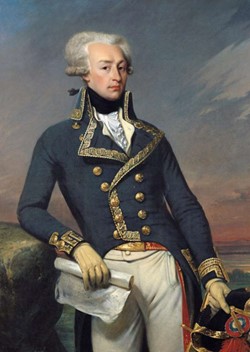


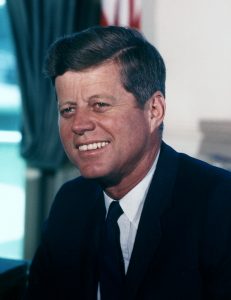
4 comments
Priscilla Leal
I was familiar with Lafayette because of Hamilton, but didnt know his story in depth. Thank you for sharing more of his story. Its interesting to see how young he was when he traveled overseas, very close to my age in fact. I like how a non-American was able to help gain america’s freedom, just shows how much we will always need outside help.
Lauren Deleon
You definitely got me with this title, I will always love a Hamilton reference, and you did such a good job telling this story. I love learning about the historical figures that inspire the characters we see in media. I was really surprised that Lafayette was so young during the revolution and also didn’t know that he had a wife in France. So thank you for teaching me something new!
Jacob Salinas
This was such a good read. Marquis de Lafayette is a very interesting person. I had no idea how much he helped America during the American Revolution. Marquis de Lafayette made a difficult decision in choosing to fight for America. He came to aid America at a time when the American needed it the most. The reinforcements were one of the reasons America was able to win the war.
Elliot Avigael
Against all odds Lafayette went against his own countrymen in order to fight for the Americans…which really shows how deep French hatred was against the English. I had heard his name only once before, and found it fascinating that he was able to serve in not one, but two major world revolutions. It’s crazy how war can create the unlikeliest of allies; not even a decade before the French were enemies of the colonists during the Seven Years War.